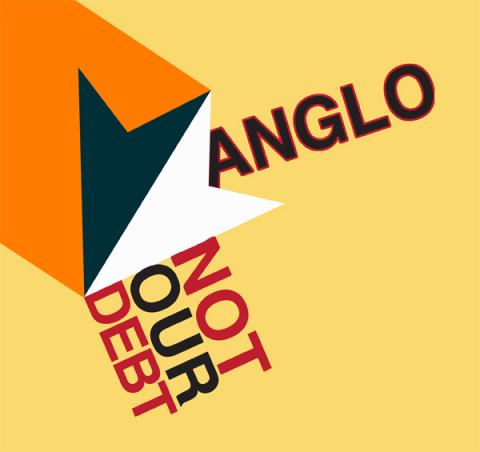Campaigners call for halt to Anglo debt repayments

A new campaigning network of local and global justice organisations, Debt Justice Action, has today called on the Government to stop paying the debts of the former Anglo Irish Bank/Irish Nationwide Building Society (INBS). The campaign group – encompassing a coalition of representatives from the trade union, community, faith-based, global justice, environmental and academic sectors – argues that the debts of these now state-owned institutions are not the responsibility of people in Ireland. Their new campaign – Anglo: Not Our Debt – is calling for the suspension of Anglo/INBS repayments as a first step towards renegotiation and writedown of this debt. The bulk of the repayments are government issued “promissory notes” – a promise to pay money in future – to Anglo/INBS which will cost Ireland over €30 billion during the next 20 years.
The campaigners say that the suspension of Anglo payments would not spread contagion through the European financial system, as most of the Anglo debt is owed to central banks and Anglo is an isolated problem from the so-called ‘pillar’ Irish banks.
Jimmy Kelly, regional secretary of the UNITE trade union, said, “This debt can be written off. All that is needed is the political will to make it happen. That depends on our government negotiating proactively and responsibly on behalf of its people.” He continued, “This action would draw a line in the sand against reckless lending practices, save billions of euro belonging to people in Ireland, and have no negative repercussions for ordinary people in Ireland or elsewhere. Our demand is feasible and winnable.”
Dublin community worker John Bisset highlighted the consequences of the proposed cutbacks for already deprived communities. “That such pain should be inflicted on those who are already most marginalised, while the gambling debts of zombie banks are paid off, including the unsecured Anglo bond of €1.25 billion falling due on 25 January, is unconscionable,” said Mr Bisset.
The campaign is calling on the government to open negotiations with the Irish and European Central Banks, who bear co-responsibility with the Irish government and Anglo bankers for the creation of the unjust Anglo debt. The campaign proposes that all payments to Anglo creditors should be suspended pending negotiations until a write down of the debt is agreed.
The campaign opposes the payments of the €1.25 billion on an unsecured Anglo bond on 25 January and the €3.1 billion IOU (or promissory note) to be paid by the government on 31 March. The €3.1 billion payment will be due each year up until 2023 with further IOU payments due beyond this date also.
The campaigners highlight the fact that the €3.1 billion payments due to be made by the State on behalf of Anglo in March 2012 would fund the cost of running Ireland’s entire primary school system for a year or could fund the implementation of a next generation broadband network for all of Ireland.
Tom McDonnell, economist with independent think-tank TASC, is providing technical advice to the group. Said McDonnell, “The promissory notes will cost over €20 billion over the next 7 years. Ireland’s debt dynamics are currently on a knife-edge. Halting the promissory note re-payments would help bring Ireland’s debt burden toward a sustainable path.”
Nessa Ní Chasaide of global justice organisation Debt and Development Coalition Ireland (DDCI) said “The unanimous message of campaigners in Africa, Asia and Latin America is that ruining whole societies to repay illegitimate debts is wrong and unworkable – a solution must be based on cancellation of illegitimate debts that ensure lenders are held accountable for their mistakes, rather than sacrificing people’s rights to fear of financial markets”. She added: “Latin American countries experienced ‘lost decades’ of development due to the failure of lenders to accept the unsustainable and illegitimate nature of many debts. But some indebted countries have taken effective action. Ecuador, after auditing its national debts, suspended some debt repayments in 2008, showing debt reductions are possible.”
Ní Chasaide called on the Irish government to apply principles of fairness and sustainability to cancelling the debts of countries in the Global South and to support internationally binding and just and responsible lending practices to prevent similar debt crises emerging anywhere in the world in the future.
Debt Justice Action will hold a public meeting at 7pm in the Teachers Club, Parnell Square, Dublin on Tuesday 24 January.
Anglo: Not Our Debt campaign is supported by:
Action From Ireland (Afri)
Africa Centre
Africa-Europe Faith and Justice Network
Ballyhea Says No To Bondholder Bailout
Canal Communities Campaign for Equality and Fairness
Centre for Global Education
Clondalkin Travellers Development Group
Comhlámh
Debt and Development Coalition Ireland
Fermoy Says No To Bondholder Bailouts
Irish Missionary Union – Justice
Just Forests
Kilbarack Community Development Project
Latin America Solidarity Centre
Little Sisters of the Assumption
NUI Maynooth Community Education, Equality and Social Activism
UCD School of Social Justice
Unite Trade Union
Sisters of Our Lady of the Apostles
Spectacle of Defiance and Hope
Individual community workers and campaigners
Independent think-tank TASC is providing technical advice to Debt Justice Action {jathumbnailoff}
